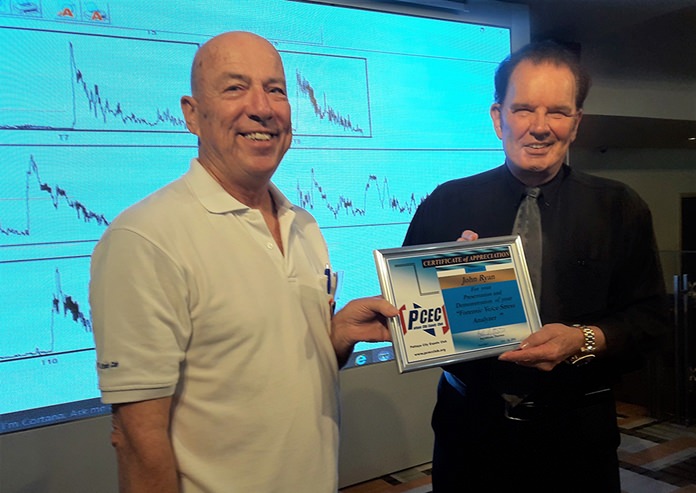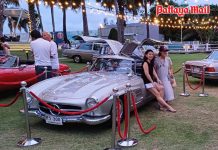“When you need the TRUTH, you need the FVSA©.” That’s one of the messages John Wayne Ryan uses to promote his Forensic Voice Stress Analyzer (FVSA), a truth detection device that John says is foolproof. John has spoken to the club on previous occasions about the development and use of the FVSA. On Sunday, July 24, 2016, John provided an update. He also presented a summary of his career as bodyguard, private investigator, stunt man and consultant to police forces in Australia and around the world.

John, born in Brisbane, knew by the time that he was 15 years old that he wanted to be a cop. But he couldn’t become one in Australia at that time because he was short-sighted and wore glasses. Instead, he trained in the martial arts, became a bodyguard, joined the military police and became interested in interrogation techniques.
Over the years, John has investigated organized crime, murders, kidnappings and corruption in Australia. The corruption extended up to some very high places. “I made two mistakes,” John told the PCEC on a previous occasion. “I investigated corrupt cops, and I investigated the premier of an Australian state. There were five attempts on my life.”
Along the way, John wrote a book, I Survived, about the “Whisky a Go-Go” murders. The murders happened when a bar of the same name was firebombed in 1973. Fifteen people died from asphyxiation. The aftermath of these murders included witnesses disappearing, kidnappings, extortion, bribery and drug running – which per John were operating under the control of senior police officers.
The Fitzgerald Commission was a royal commission launched in 1987 into corrupt police practices in Australia. John said that a few corrupt police officers were named by the Commission, but that it never questioned the main culprit.
In the 1990s, John provided combat training to police forces in Australia and the U.S. He was also involved in setting up special patrols in the Western Australian city of Belmont, where he said the reported crime rate was cut by 50% as a result.
John first became interested in truth detection in the 1970s and 1980s. John mentioned that there was no such thing as a lie detector. The first so-called lie detector test, also known as the polygraph test, was invented in 1930 by a California police officer. The machines measured and recorded several physiological indices such as blood pressure, pulse, respiration and skin conductivity while the subject is asked and answers a series of questions. The only problem with them, John explained, is that they didn’t work! The polygraphs were developed by police and military personnel, with no involvement by academics, engineers or scientists.
In 1971, a polygraph expert and two of his colleagues produced another instrument called the PSE – psychological stress evaluator. When the PSE was attached to a tape recorder, it became possible to slow down recorded speech by four times, play it through some filters, and print out the results on paper similar to the paper used for the polygraph. The idea was that voice speech patterns would reveal whether someone was being truthful or deceptive.
But the first PSE machines didn’t work either. As John told the PCEC on a previous occasion, between 1972 and 1994 several analogue and digitalized voice stress analyzers arrived on the market, most of them based on the PSE. In 2006, John explained that after much research and development, he and several colleagues launched the FVSA. Further, in 2007 they sold their first units to Singapore and Malaysia; and that the FVSA is now being used in Australia, Brunei, South Africa, the U.K. and the U.S. Also, the FVSA is not a machine, but actually a software programme which can be loaded on any computer.
John described how the FSVA measures not only modulations in the voice but also all frequencies produced by internal muscle groups, such as the heart, pancreas and kidneys, all of which are controlled by the vagus nerve system. In fact, the device was originally called the Forensic Vagus System Analyzer. But no one knew what “vagus” meant, so the name was changed to Forensic Voice Stress Analyzer.
John explained that the human voice is produced by a combination of the lungs, vocal folds and articulators. When a person who is asked a question is being deceptive, the body produces a physiological reaction which cannot be controlled, even if the question is one of no consequence (such as “Did you brush your teeth last night?”) The response may not necessarily be audible, but the FVSA will pick it up. John said that the only way to beat the FVSA is to hold your breath forever (which means committing suicide).
John cited a commendation letter he received from a detective in California. The letter said, “This is to certify that the FVSA [is] a highly effective investigative tool… The problem of eliminating the innocent was made much easier with the use of the FVSA.”
John listed some high profile cases where the FVSA has been used with 100% success. These included the Bangladesh War Crimes Tribunal, the Anti-Corruption Commission in Malaysia, a five-year old cold case in the Cyber Crime Unit in India, and multiple shootings in Los Angeles, California.
As he has done on previous occasions, John demonstrated the FVSA with the help of a member of the audience. He noted that his questions would not be such that answering them would embarrass the volunteer.
After the presentation, MC Roy Albiston brought everyone up to date on upcoming events and called on Ira Wettenstein to conduct the Open Forum, where questions are asked and answered about Expat living in Thailand, especially Pattaya.
For more information on the PCEC’s many activities, visit their website at www.pcecclub.org.




